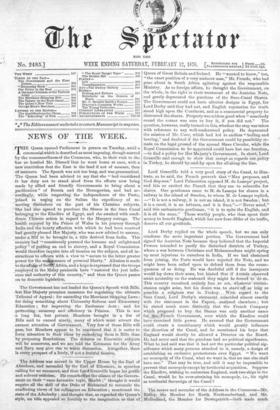The Address was moved in the Upper House by the
Earl of Aberdeen, and seconded by the Earl of Ellesmere, in speeches calling for no comment, and then Lord Granville began his gentle and solvent criticism. He remarked on the silence of the Govern- ment on their " once favourite topic, Health ;" thought it would require all the skill of the Dnke of Richmond to reconcile the conflicting views of his colleagues on Education ; mentioned the state of the Admiralty ; and thought that, as regarded the Queen's style, no title appealed so forcibly to the imagination as that of Queen of Great Britain and Ireland. He " wanted to know," too, "the exact position of a very eminent man," Mr. Froude, who had gone about in South Africa agitating against the responsible Ministry. As to foreign affairs, he thought the Government, on the whole, in the right in their treatment of the Austrian Note, and gently deprecated the purchase of the Suez-Canal Shares. The Government could not have ulterior designs in Egypt, for Lord Derby said they had not, and English reputation for truth stood high upon the Continent, and as a commercial property he distrusted the shares. Property was seldom good when "somebody round the corner was sure to buy it, if you did not." The question, however, really turned on this, whether the step was taken with reference to any well-understood policy. He deprecated the mission of Mr. Cave, which had led to endless " bulling and bearing," and doubted if the Government could by possibility re- main on the legal groHnd of the second Slave Circular, while the Royal Commission to be appointed could have but one function, —to find a policy for Her Majesty's Government. In short, Lord Granville said enough to show that except as regards our. policy in Turkey, he should by-and-by open fire all along the line.


































